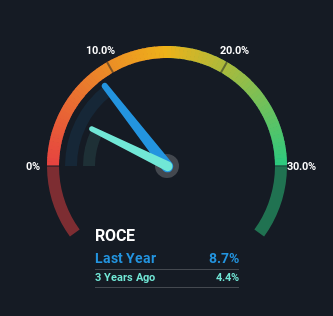Here's What's Concerning About Proventus Agrocom's (NSE:PROV) Returns On Capital
What trends should we look for it we want to identify stocks that can multiply in value over the long term? Typically, we'll want to notice a trend of growing return on capital employed (ROCE) and alongside that, an expanding base of capital employed. This shows us that it's a compounding machine, able to continually reinvest its earnings back into the business and generate higher returns. Having said that, from a first glance at Proventus Agrocom (NSE:PROV) we aren't jumping out of our chairs at how returns are trending, but let's have a deeper look.
Understanding Return On Capital Employed (ROCE)
Just to clarify if you're unsure, ROCE is a metric for evaluating how much pre-tax income (in percentage terms) a company earns on the capital invested in its business. Analysts use this formula to calculate it for Proventus Agrocom:
Return on Capital Employed = Earnings Before Interest and Tax (EBIT) ÷ (Total Assets - Current Liabilities)
0.087 = ₹107m ÷ (₹1.4b - ₹191m) (Based on the trailing twelve months to March 2024).
Thus, Proventus Agrocom has an ROCE of 8.7%. In absolute terms, that's a low return and it also under-performs the Food industry average of 13%.
View our latest analysis for Proventus Agrocom

Historical performance is a great place to start when researching a stock so above you can see the gauge for Proventus Agrocom's ROCE against it's prior returns. If you're interested in investigating Proventus Agrocom's past further, check out this free graph covering Proventus Agrocom's past earnings, revenue and cash flow.
What Can We Tell From Proventus Agrocom's ROCE Trend?
When we looked at the ROCE trend at Proventus Agrocom, we didn't gain much confidence. Around five years ago the returns on capital were 38%, but since then they've fallen to 8.7%. However, given capital employed and revenue have both increased it appears that the business is currently pursuing growth, at the consequence of short term returns. If these investments prove successful, this can bode very well for long term stock performance.
On a side note, Proventus Agrocom has done well to pay down its current liabilities to 13% of total assets. Since the ratio used to be 69%, that's a significant reduction and it no doubt explains the drop in ROCE. What's more, this can reduce some aspects of risk to the business because now the company's suppliers or short-term creditors are funding less of its operations. Some would claim this reduces the business' efficiency at generating ROCE since it is now funding more of the operations with its own money.
The Bottom Line
While returns have fallen for Proventus Agrocom in recent times, we're encouraged to see that sales are growing and that the business is reinvesting in its operations. Furthermore the stock has climbed 13% over the last year, it would appear that investors are upbeat about the future. So while investors seem to be recognizing these promising trends, we would look further into this stock to make sure the other metrics justify the positive view.
Like most companies, Proventus Agrocom does come with some risks, and we've found 1 warning sign that you should be aware of.
While Proventus Agrocom may not currently earn the highest returns, we've compiled a list of companies that currently earn more than 25% return on equity. Check out this free list here.
New: Manage All Your Stock Portfolios in One Place
We've created the ultimate portfolio companion for stock investors, and it's free.
• Connect an unlimited number of Portfolios and see your total in one currency
• Be alerted to new Warning Signs or Risks via email or mobile
• Track the Fair Value of your stocks
Have feedback on this article? Concerned about the content? Get in touch with us directly. Alternatively, email editorial-team (at) simplywallst.com.
This article by Simply Wall St is general in nature. We provide commentary based on historical data and analyst forecasts only using an unbiased methodology and our articles are not intended to be financial advice. It does not constitute a recommendation to buy or sell any stock, and does not take account of your objectives, or your financial situation. We aim to bring you long-term focused analysis driven by fundamental data. Note that our analysis may not factor in the latest price-sensitive company announcements or qualitative material. Simply Wall St has no position in any stocks mentioned.
Have feedback on this article? Concerned about the content? Get in touch with us directly. Alternatively, email editorial-team@simplywallst.com
About NSEI:PROV
Proventus Agrocom
Engages in the processing, distributing, and retail of health food in India.
Excellent balance sheet with questionable track record.
Similar Companies
Market Insights
Community Narratives




